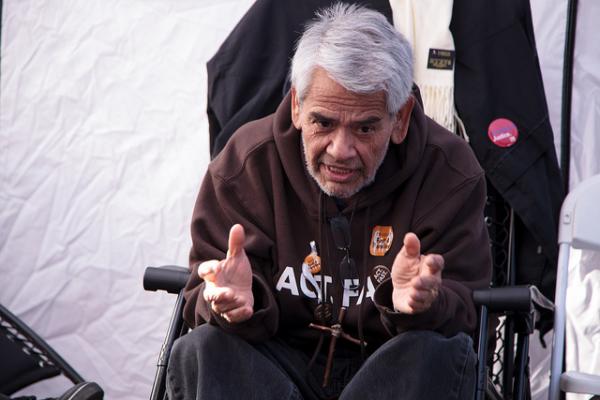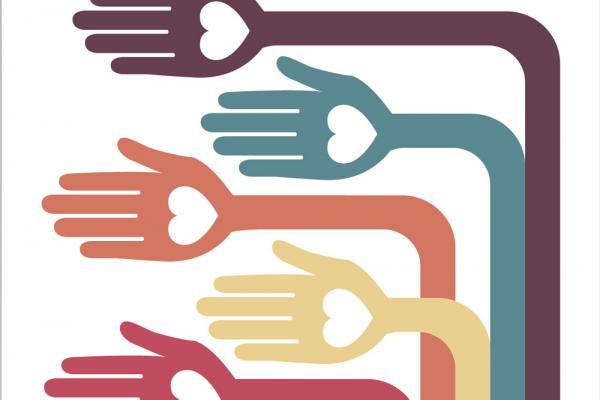World Vision found itself testing the evangelical boundaries in March when it announced it would recognize employees’ same-sex marriages. Within 48 hours, it reversed itself.
At its core, the reversal raised a stark question: Can you be an evangelical and support same-sex marriage?
Reverberations from the policy flip-flop continue to unfold. Last week, Jacquelline Fuller, director of corporate giving at Google, resigned from the international relief organization’s board. Faithful America, an online Christian community focused on social justice, had gathered 16,000 signatures calling for Fuller and John Park, another Google employee who sits on the World Vision board, to step down.
Editor's Note: The following story originally appeared HERE in The Australian Financial Review.
Jarrod McKenna is in trouble. It's not that the dreadlocked Christian activist is at risk of being arrested, as he has been at several anti-war and anti-coal protests. Rather, he has let five-year-old Congolese refugee Zephanta Baganizi eat the leftovers of our very late lunch, shortly before dinner time.
"Have you asked your mum if it's OK?" McKenna asks "Zopho," who is gazing at several pieces of bolani, a vegan flat-bread meal from Afghanistan. Transfixed by the food, Zopho doesn't respond.
"Just a small piece, then."
Zopho grabs the biggest piece. He runs off to his family's apartment, mouth overflowing with fried bread and vegetable filling.
"I'm in trouble," McKenna says.
The interaction between Australian, Congolese and Afghan food, people and culture is not uncommon at a large block at the end of Dudley Street in the outer Perth suburb of Midland.
It is the location of First Home Project; a former methamphetamine lab transformed into three apartments that provide medium-term accommodation at below-market rates for refugees transitioning into their new Australian lives.
As an immigrant who made the long journey from Zacatecas, Mexico, to the farmlands of California many times as a child, the Lenten story of Jesus’s wandering for 40 days in the desert has always resonated with me very deeply. And the Easter celebration that follows sustains my hope and resolve that the faith community’s long movement to reform our broken immigration system will succeed.
Late last year, I, along with several other immigration advocates and inspiring faith leaders, camped out in a tent on the National Mall in Washington, D.C., to call attention to the moral crisis and human suffering caused by our broken immigration system. We asked ourselves: What are our faith, our words, and our history worth if not translated into action, sacrifice, and redemption?
So, for 30 days we fasted and prayed that leadership in the House of Representatives would follow the Senate’s lead and pass a comprehensive, bipartisan immigration reform bill. The power of prayer surrounded us as we were led in reflection on a daily basis by pastors who serve undocumented families, by immigrants who suffer under our unjust system, and by public officials who came to see our commitment as days without food turned into weeks.
Even though the House refused to act in 2013, we believe that our fast, and the support of thousands of solidarity fasters around the world, helped change the discussion about reform from one of dollars and cents to one about people and families. Our sacrifice and the suffering of our immigrant brothers and sisters will end in victory and redemption.
As we approach Holy Week, I’ve been re-reading the Gospel accounts of Jesus’ Last Supper, trial, crucifixion, and resurrection. In John 17, as Jesus prays for his disciples and their successors in the hours before he is arrested, he prays for our unity as his church:
…that all of them may be one, Father, just as you are in me and I am in you… May they be brought to complete unity to let the world know that you sent me and have loved them even as you have loved me. (John 17:21, 23)
Central to our mission as Christ’s followers is to share with the world this good news: that the Father sent the Son because he so loved the world — but the best observable evidence of that Gospel reality, a unified Church, seems a distant, utopian dream. Just within the United States — this small sliver of the global church — we are divided by denomination, by race, by political ideology, and by the competitive human instinct that leads even those congregations who resemble one another doctrinally, ethnically, and politically to jockey over the same individuals in order to fill their sanctuaries (or auditoriums) and offering plates. Perhaps the situation is not quite so stark: I know that many — probably most — believers share the desire for unity. It just seems at times that we have so far to go, and might be drifting in the wrong direction.
When I was growing up, I had three older cousins who were my models for being awesome. They were funny, smart, athletic, and they loved baseball.
And so I wanted to be all of those things, but the one thing I could do without any effort was love baseball.
But I had one major problem. I’m missing the athletic gene of the Ericksen family. While I could share in the love my cousins had for baseball, I couldn’t share in their athletic ability. I lack coordination, which creates problems in every aspect of baseball. I once tripped while running to first base. Embarrassed, I ran back to the dugout and insisted to my teammates that I didn’t trip – I dove. But by the fourth grade, every baseball player knows that you never dive into first base. You run through it.
In sixth grade I played third base. I fielded a grounder that took a bad hop – right to my forehead. I laid on the dirt, crying, and thinking that I never wanted to play again. I finished that game, but never replay organized baseball again.
So, my baseball career was a failure, but I still love the game. The smell of the grass, the crack of the bat, a diving catch – my total lack of athletic ability allows me to appreciate those who have honed their athleticism.
St. Bonaventure (d. 1274) once said, “Whoever is not enlightened by the splendor of created things is blind; whoever is not aroused by the sound of their voice is deaf; whoever does not praise God for all these creatures is mute; whoever after so much evidence does not recognize the Maker of all things, is an idiot.”[1]
If Bonaventure was right, then we’re all idiots.
The first time I travelled to Rome was an experience second to none. Never, in my young travels, had I ventured to a place so layered with history and significance around every corner that one literally couldn’t escape it. Even the Roman suburbs were historical. We were amped to see it all. Our approach was simple: we would incrementally make our way through the city over the course of 10 days with a plan that would make any explorer proud.
The sheer magnitude of historical and ecclesiastical sites to be seen in the city was overwhelming at best. Then it happened. I had a unique moment near the end of the trip. We’d been walking nonstop through museums, ruins, churches; we’d even heard the pope preach a sermon, when I started to lose my attention. Many travelers or art buffs will resonate with this — there came a point during our endless walk through Rome where I had seen so much beauty and splendor and history that I just started taking it all for granted. The last two days consisted of me walking around blindly and numbly, room-to-room, ruin-to-ruin, as though what I stood before was of little or no value.
I called it “beauty exhaustion.”
As an interfaith advocate, I find total inspiration in Dr. Martin Luther King’s multi-layered approach to peace and justice:
“Make a career of humanity. Commit yourself to the noble struggle for equal rights. You will make a greater person of yourself, a greater nation of your country, and a finer world to live in.”
The reason that I do interfaith, and the reason I signed the pledge to be Better Together, is because I believe that religion can be used as a tool for good in all three layers that King is referencing: in our world, in our country, and in ourselves.






